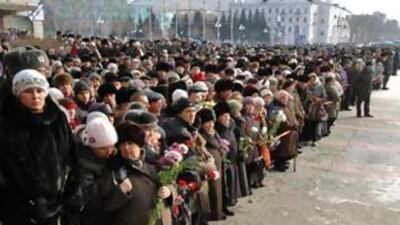A sailor has been charged for setting off the fire extinguishing system on the Russian nuclear submarine Nerpa, causing 20 people to be gassed to death, investigators told news agencies today. "The inquiry has established that a member of the crew, a sailor, set off the anti-fire system... without authorisation and for no reason," the investigator Vladimir Markin was quoted as saying by RIA-Novosti.
"This sailor has already admitted his error", said Mr Markin, a spokesman for the inquiry panel looking into yesterdays deadly accident in the Sea of Japan that raised new doubts about the safety of Russian military hardware. "In connection with this, the suspect faces charges... of negligence leading to the death of two or more people", Mr Markin said. The sailor could face up to seven years in prison for his role in the incident, which killed 20 and led to 21 others being hospitalised, RIA Novosti said.
Twenty people died when the fire-extinguishing system was triggered as the new Akula-class nuclear-powered attack submarine was being tested in the Sea of Japan, pumping Freon gas into the vessel and depriving them of oxygen. The authorities said there was no fire aboard the vessel. An investigation was opened into whether criminal negligence had led to the incident, whose victims included three navy personnel and 17 civilians, many of them shipyard workers participating in the tests.
Independent defence experts alleged that the sailor facing charges may turn out to be a scapegoat for a broader failure. "It will be absolutely unfair if this sailor is designated the sole person to be guilty of what happened", Alexander Golts, a defence commentator at Yezhednevny Zhurnal magazine, told AFP. "In Russia there is always a tendency to look for a scapegoat", said Pavel Felgenhauer, another defence expert. "The critical lack of qualified personnel in Russia since the fall of the Soviet Union is the cause of most disasters."
Defective gas masks may also have been responsible for a large number of the deaths on the Nerpa, the Russian tabloid Tvoi Den reported, citing survivors. "I saw people in convulsions ripping off their masks. I also had a breathing apparatus on, but it only worked for seven to 15 minutes", the newspaper quoted warrant officer Yevgeny Ovsyannikov as saying. "Some of the dead were found with their gas masks on. The breathing apparatuses simply didnt work," another survivor, Dmitry Usachyov, was quoted as saying by Tvoi Den.
Despite the accident the Nerpa passed its tests and will be authorised for use by the Russian navy, the head of the militarys general staff, Nikolai Makarov, told news agencies yesterday. Russian media reported earlier that the vessel was to be leased to India on a contract worth 650 million dollars, but a senior arms industry official told news agencies that this was not the case. The accident came at a time when Russia has been flexing its military muscle around the world, with Russian warships due to participate in joint exercises with the Venezuelan navy in the Caribbean Sea later this month.
It was the worst naval disaster in Russia since the sinking of the Kursk submarine in the Barents Sea in 2000 in which all 118 sailors on board died. The Russian military has been plagued with deadly accidents in recent years, often related to problems with ageing Soviet-era equipment. *AFP

